2024届高三英语一轮复习情态动词课件(共16张PPT)
文档属性
| 名称 | 2024届高三英语一轮复习情态动词课件(共16张PPT) |

|
|
| 格式 | pptx | ||
| 文件大小 | 264.9KB | ||
| 资源类型 | 教案 | ||
| 版本资源 | 通用版 | ||
| 科目 | 英语 | ||
| 更新时间 | 2024-01-19 17:57:59 | ||
图片预览

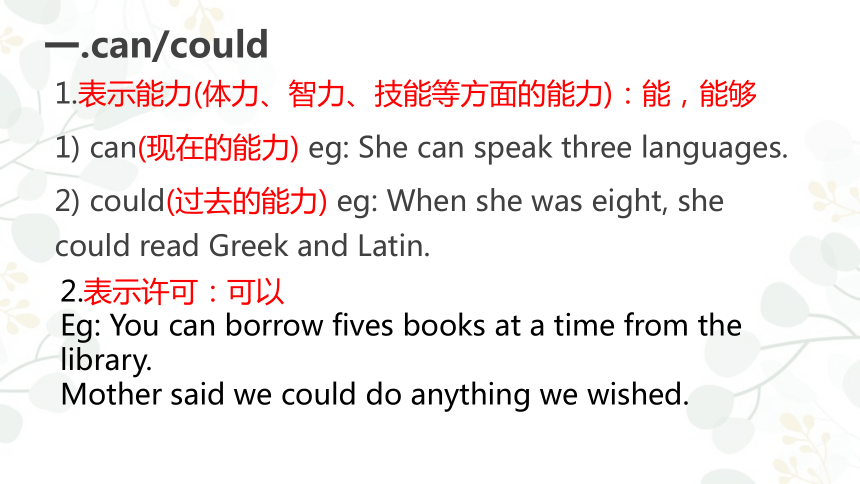
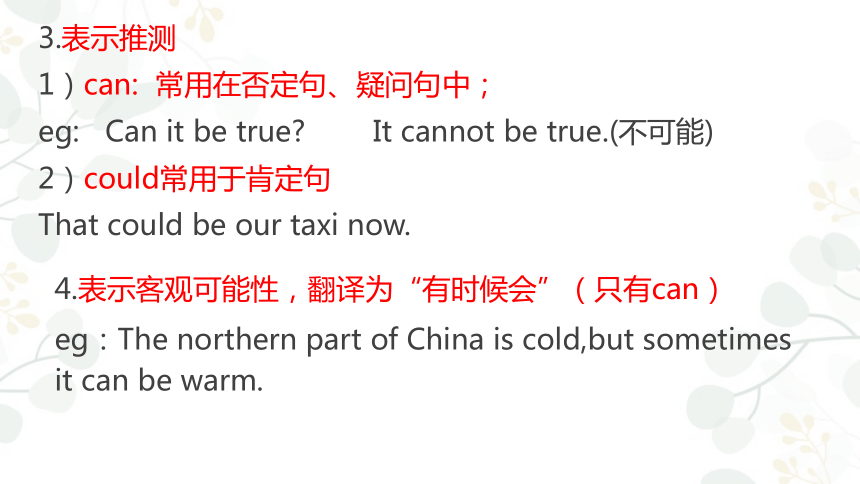
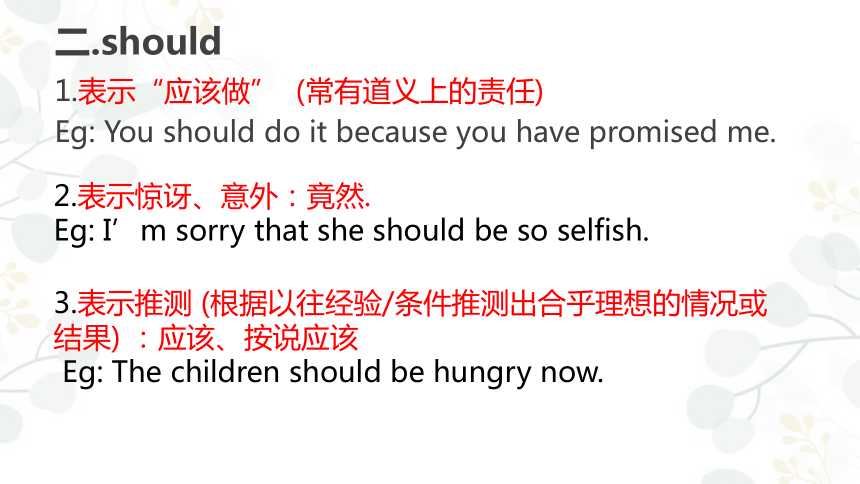
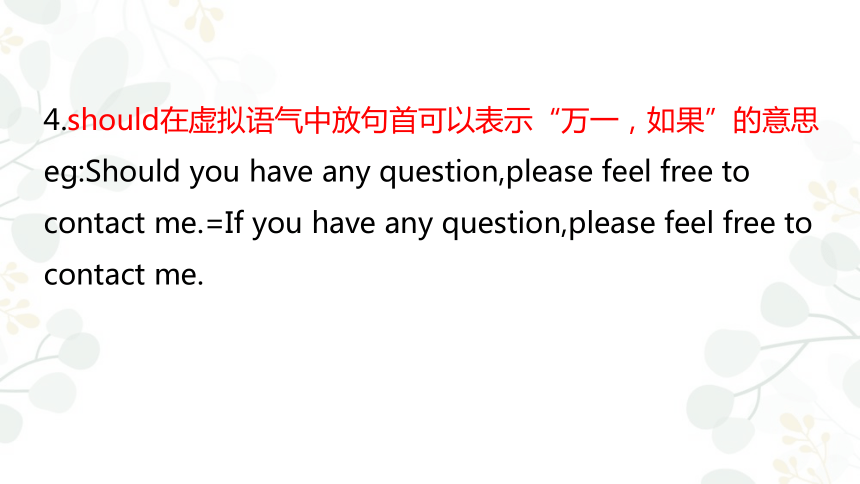
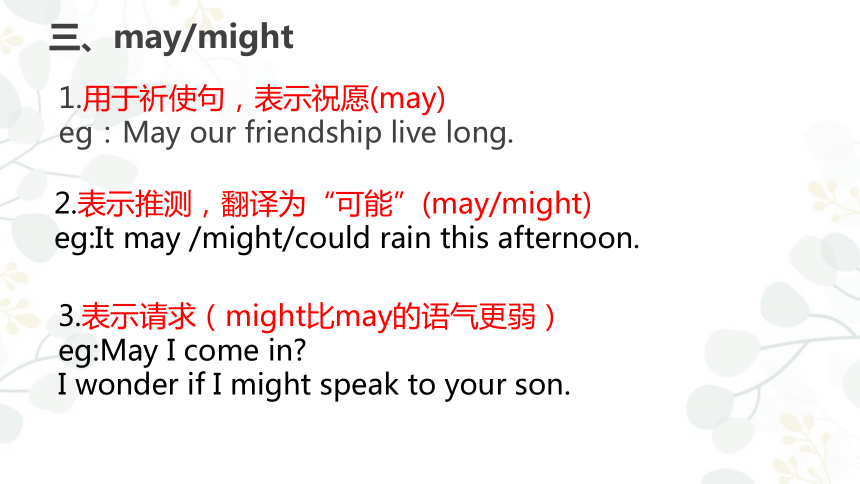

文档简介
(共16张PPT)
情态动词
一.can/could
1.表示能力(体力、智力、技能等方面的能力):能,能够
1) can(现在的能力) eg: She can speak three languages.
2) could(过去的能力) eg: When she was eight, she could read Greek and Latin.
2.表示许可:可以
Eg: You can borrow fives books at a time from the library.
Mother said we could do anything we wished.
3.表示推测
1)can: 常用在否定句、疑问句中;
eg: Can it be true It cannot be true.(不可能)
2)could常用于肯定句
That could be our taxi now.
4.表示客观可能性,翻译为“有时候会”(只有can)
eg:The northern part of China is cold,but sometimes it can be warm.
二.should
1.表示“应该做” (常有道义上的责任)
Eg: You should do it because you have promised me.
2.表示惊讶、意外:竟然.
Eg: I’m sorry that she should be so selfish.
3.表示推测 (根据以往经验/条件推测出合乎理想的情况或结果) :应该、按说应该
Eg: The children should be hungry now.
4.should在虚拟语气中放句首可以表示“万一,如果”的意思
eg:Should you have any question,please feel free to contact me.=If you have any question,please feel free to contact me.
三、may/might
1.用于祈使句,表示祝愿(may)
eg:May our friendship live long.
2.表示推测,翻译为“可能”(may/might)
eg:It may /might/could rain this afternoon.
3.表示请求(might比may的语气更弱)
eg:May I come in
I wonder if I might speak to your son.
5.may的否定回答用mustn’t,表示禁止
eg:—May I take the magzine out of the reading room
—No,you mustn’t.Please read it here.
4.may /might as well do :倒不如,不妨
eg:There is nothing to do,so I may as well go to bed.
四.Must
1.表示肯定推测:一定.
Eg: This must be Jim’s pen.
2.表示说话人的主观看法:必须
eg: You must be back before 10 o’clock.
3.must: 偏偏、偏要,非要
She must go and do the opposite after I gave her my advice.
4.must 的否定形式为mustn’t 翻译为“禁止”
eg:You mustn’t make noise in the library.
5.must提问肯定回答用must,否定回答用needn’t 或don’t have to.
eg:—Must I finish my work now
—Yes,you must.
—No,you needn’t/don’t have to.
五.shall
1.用于一三人称疑问句,表示征求对方的意见或建议,翻译为“要不要”“好不好”
Eg: Shall I buy the dictionary
2.用于二三人称陈述句,表示说话人的语气,一般为允诺、命令、威胁、警告等。
eg:You shall get my reply tomorrow.
3.用于文字性的条文条款,法律法规当中:必须,务必(rule、regulation、sign、law)
eg:Each citizen shall carry his identification card when travelling.
六、will/would
1.表示意志、愿望或者意愿,will指现在,would指过去。
eg:I won’t give up halfway.
They would not let him in because he was poorly dressed.
2.表示请求,would比will委婉。
Eg: Will you give her the letter
Would you please tell me your telephone number
3.表示事物的固有性质或倾向性(will)。
Eg: The window won’t open.
My pen won’t write.
5.表示人的习惯,翻译为“总会”will表示现在,would do 表示过去常常。
eg:People will talk.
When he was a child,he would often go skiing.
六.情态动词+have done (表示过去发生)
表示推测 肯定形式 must have done 过去一定做了某事
can(疑问) /could have done 过去可能做了某事
may/might have done 过去也许做了某事
六.情态动词+have done (表示过去发生)
表示推测 否定形式 can’t have done couldn’t have done 过去不可能做了某事
may not have done might not have done 过去也许没做某事
六.情态动词+have done (表示过去发生)
表示虚拟 肯定形式 could have done 过去本可能做某事但实际未做
might have done 过去本可能做某事但实际未做
should/ought to have done 本该做但实际未做
六.情态动词+have done (表示过去发生)
表示虚拟 否定形式 couldn’t have done 没能够做某事(与过去事实相反)
should not/ought not to have done 本不该做但实际做了
needn’t have done 本不必做但实际做了
情态动词
一.can/could
1.表示能力(体力、智力、技能等方面的能力):能,能够
1) can(现在的能力) eg: She can speak three languages.
2) could(过去的能力) eg: When she was eight, she could read Greek and Latin.
2.表示许可:可以
Eg: You can borrow fives books at a time from the library.
Mother said we could do anything we wished.
3.表示推测
1)can: 常用在否定句、疑问句中;
eg: Can it be true It cannot be true.(不可能)
2)could常用于肯定句
That could be our taxi now.
4.表示客观可能性,翻译为“有时候会”(只有can)
eg:The northern part of China is cold,but sometimes it can be warm.
二.should
1.表示“应该做” (常有道义上的责任)
Eg: You should do it because you have promised me.
2.表示惊讶、意外:竟然.
Eg: I’m sorry that she should be so selfish.
3.表示推测 (根据以往经验/条件推测出合乎理想的情况或结果) :应该、按说应该
Eg: The children should be hungry now.
4.should在虚拟语气中放句首可以表示“万一,如果”的意思
eg:Should you have any question,please feel free to contact me.=If you have any question,please feel free to contact me.
三、may/might
1.用于祈使句,表示祝愿(may)
eg:May our friendship live long.
2.表示推测,翻译为“可能”(may/might)
eg:It may /might/could rain this afternoon.
3.表示请求(might比may的语气更弱)
eg:May I come in
I wonder if I might speak to your son.
5.may的否定回答用mustn’t,表示禁止
eg:—May I take the magzine out of the reading room
—No,you mustn’t.Please read it here.
4.may /might as well do :倒不如,不妨
eg:There is nothing to do,so I may as well go to bed.
四.Must
1.表示肯定推测:一定.
Eg: This must be Jim’s pen.
2.表示说话人的主观看法:必须
eg: You must be back before 10 o’clock.
3.must: 偏偏、偏要,非要
She must go and do the opposite after I gave her my advice.
4.must 的否定形式为mustn’t 翻译为“禁止”
eg:You mustn’t make noise in the library.
5.must提问肯定回答用must,否定回答用needn’t 或don’t have to.
eg:—Must I finish my work now
—Yes,you must.
—No,you needn’t/don’t have to.
五.shall
1.用于一三人称疑问句,表示征求对方的意见或建议,翻译为“要不要”“好不好”
Eg: Shall I buy the dictionary
2.用于二三人称陈述句,表示说话人的语气,一般为允诺、命令、威胁、警告等。
eg:You shall get my reply tomorrow.
3.用于文字性的条文条款,法律法规当中:必须,务必(rule、regulation、sign、law)
eg:Each citizen shall carry his identification card when travelling.
六、will/would
1.表示意志、愿望或者意愿,will指现在,would指过去。
eg:I won’t give up halfway.
They would not let him in because he was poorly dressed.
2.表示请求,would比will委婉。
Eg: Will you give her the letter
Would you please tell me your telephone number
3.表示事物的固有性质或倾向性(will)。
Eg: The window won’t open.
My pen won’t write.
5.表示人的习惯,翻译为“总会”will表示现在,would do 表示过去常常。
eg:People will talk.
When he was a child,he would often go skiing.
六.情态动词+have done (表示过去发生)
表示推测 肯定形式 must have done 过去一定做了某事
can(疑问) /could have done 过去可能做了某事
may/might have done 过去也许做了某事
六.情态动词+have done (表示过去发生)
表示推测 否定形式 can’t have done couldn’t have done 过去不可能做了某事
may not have done might not have done 过去也许没做某事
六.情态动词+have done (表示过去发生)
表示虚拟 肯定形式 could have done 过去本可能做某事但实际未做
might have done 过去本可能做某事但实际未做
should/ought to have done 本该做但实际未做
六.情态动词+have done (表示过去发生)
表示虚拟 否定形式 couldn’t have done 没能够做某事(与过去事实相反)
should not/ought not to have done 本不该做但实际做了
needn’t have done 本不必做但实际做了
